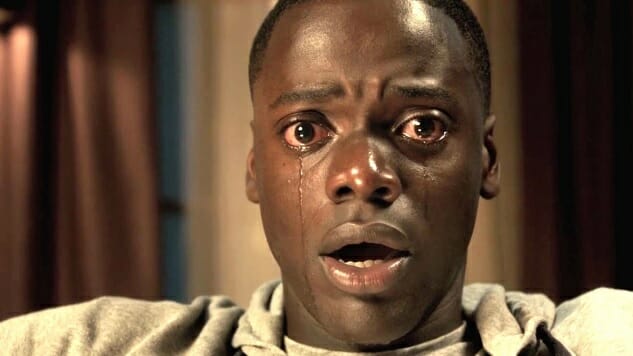Get Out

One of Get Out’s key scenes occurs within its first twenty minutes, as protagonists Chris (Daniel Kaluuya) and Rose (Allison Williams) get ready for bed after a day of awkward greetings. Chris, a young black man, has just met Rose’s white parents, the Armitages, Missy (Catherine Keener) and Dean (Bradley Whitford), for the first time, and endured Dean’s clumsy attempts at post-racial posturing: He asks his daughter and her beau how long their “thang” has been going on for, he addresses Chris as “my man,” and he claims that he would have voted for Obama for a third time if he could have. For Chris, Dean’s faux-enlightened displays are run of the mill. For Rose, they’re an embarrassing affront to decency.
At night she brushes her teeth and offers apologies for her family, shocked at her dad’s lame dork schtick and disgusted by her douchebag brother, Jeremy (Caleb Landry Jones), who talks about Chris’ “genetic makeup” over dinner. But Chris is unfazed. This is what he expected, and what he’s inured to in his interactions with white people. What’s more troubling to him are his encounters with Missy and Dean’s hired help, Georgina (Betty Gabriel) and Walter (Marcus Henderson), who react to Chris’ presence with what’s best described as robotic surprise. They’re more bewildered by his arrival than he is by his hosts’ casual racism. In turn, he starts to sense that there’s something weird going on, and that’s before Get Out’s real weirdness spills out from the margins, where director Jordan Peele stores it for most of the film’s running time.
Peele’s partner in socially minded comedy, Keegan-Michael Key, is the breakout actor from their retired sketch comedy series, Key and Peele, but Get Out has positioned Peele as the breakout storyteller. This would be a great film coming from a seasoned filmmaker. Coming from Peele, sitting in the director’s chair for the first time, it’s illuminating. His star isn’t born here, but reborn. Not that a guy with Peele’s cultural cachet is likely desperate for work, of course, but if he’s wondering where to take his career post-Key and Peele, well, he should wonder no longer and just focus on leveraging that cachet to direct more movies. It’s a given that Get Out happens to be smart and keeps its tongue glued to its cheek. It’s more a wonder that it’s so well made to boot, a polished effort threaded together with impressive, varied degrees of craft (particularly close-ups, here used to make our skin crawl right off our flesh).
Peele’s a natural behind the camera, but Get Out benefits most from its deceptively trim premise whose simplicity belies rich thematic depth. Chris and Rose go to spend a weekend with her folks in their lavish upstate New York mansion, where they’re throwing the annual Armitage bash with all their friends in attendance. Chris immediately feels out of place; events escalate from there, taking the narrative in a ghastly direction that ultimately ties back to the unsettling sensation of being the “other” in a room full of people who aren’t like you and never let you forget it. Put indelicately, Get Out is about being black and surrounded by whites who squeeze your biceps without asking, who fetishize you to your face, who analyze your blackness as if it’s a fashion trend.
-

-

-

-

-

-

-

-

-

-

-

-

-

-

-

-

-

-

-

-

-

-

-

-

-

-

-

-

-

-

-

-

-

-

-

-

-

-

-

-








































